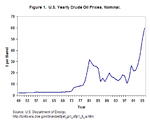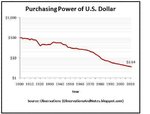cmmichaels
Member
- Messages
- 65
- Likes
- 7
Hello,
I have a quick question that does not have a quick answer but I would be interested to know peoples views. Who on here thinks that speculation in the energy markets and the deregulation of OTC derivatives is the cause of unnecessary price fluctuations in the spot market and caused the huge spike in oil prices since the 90s as shown below?
I'm sure this has been discussed before but if anyone has a view on this I would love to hear it.

I have a quick question that does not have a quick answer but I would be interested to know peoples views. Who on here thinks that speculation in the energy markets and the deregulation of OTC derivatives is the cause of unnecessary price fluctuations in the spot market and caused the huge spike in oil prices since the 90s as shown below?
I'm sure this has been discussed before but if anyone has a view on this I would love to hear it.


